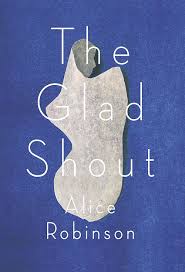The Glad Shout (Affirm Press 2019) by Alice Robinson is a taut and tension-filled novel that combines both a compelling narrative with a tender exploration of the complexities of relationships. The book opens with Isobel, her partner Shaun and their three-year-old daughter Matilda, as they struggle to orientate themselves at an Emergency Relief Centre set up in a sports stadium in one of Australia’s capitals. A massive storm has caused havoc and disaster, with major flooding inundating the entire city.
The place is in turmoil, with underequipped aid workers trying to manage the distribution of supplies of food, water and shelter, flimsy and overcrowded medical tents providing inadequate care to the sick and injured, long queues for the stinking latrines, and outside – almost breaching the high walls of the stadium – the relentless water, thick with death, decomposition, submerged hazards and water-borne pollutants.
The chapters alternate between this scene of post-disaster survival, and Isobel’s memories of growing up with her family: her cold, judgmental and exacting mother Luna; her wild and beloved grandmother Karen; and her brother Josh, troubled and distant, who – as we learn early in the story – has disappeared from their lives for some reason.
The author very cleverly drip-feeds the circumstances of the setting of this story so that at the beginning, we believe the novel could be set today, or at least in the not too distant future. Climate change is obviously an issue, and the destructive storm and the chaos of its aftermath seems like an event that could plausibly happen to this generation. It doesn’t have the usual feel of an apocalyptic or dystopian narrative. But gradually, as the story progresses, we learn more about the setting and the time as the author drops hints about the prevailing circumstances – it may only be a casual line or a quiet phrase, but it is enough for us to realise that the world in which this novel is set is quite different from what we at first imagine, and the magnitude of the disaster is much greater than we at first suspect. To say too much about this would be to spoil the effect, but suffice to say that the structure is a sophisticated blend of this new world order and Isobel’s memories of her past, such that like a frog placed in cold water and boiled gradually, the precariousness of the situation creeps upon us without us even noticing, until we realise just what a predicament faces the characters.
There is a message in the novel about the fragility and temporariness of things; that houses, possessions, treasured belongings and memorabilia all are easily lost, and what then? It questions the value we place on stuff that is, in the end, transient and insignificant; it reminds us of the contrast between our collection of ultimately inconsequential things, and the endurance of developing relationships.
But the real strengths of this novel are twofold. Firstly, the author communicates a nuanced portrayal of the effects of climate change and of the issue of people displaced, whether through environmental reasons or because of political reasons or civil unrest. It reminded me of that SBS show ‘Go Back To Where You Came From’ because it places the familiar characters – people with whom we can identify – in situations that today face much of the world’s population, and gives us an opportunity to reflect on how we would react if presented with the same circumstances. The plot seems entirely believable and real and it is easy to imagine ourselves having to make the same untenable choices. Secondly, the book is a complex exploration of relationships between mothers and their children, between lovers, and between strangers caught in tragic situations. But mostly the focus is on the complexities of love, loyalty, betrayal, sacrifice, jealousy, reliance and interdependence between children and parents; the bitter sting of ungratefulness, the unfathomable pull of belonging, the never-ending tug-of-war between family trying and often failing to be to each other what they need.
And the book champions the role of women – their hidden strengths, their persistence in the face of insurmountable hurdles, their unbreakable bonds with each other.
One passage that I particularly loved in the book was this: ‘The value of a child can’t be in their sure provision of lifelong joyous milestones – a graduation, a wedding, a grandchild – because anything less than that will feel so manifestly unfair, as though what was promised has not been delivered. Isobel doesn’t want to live with that kind of grief and disappointment, if things go wrong. Things can go wrong. Not all children live to adulthood. People leave. Disappear. Given this, Matilda’s worth to Isobel must come from her experience of Matilda in the now, and nothing more.’ I found this profound, and also inexpressibly sad.
The narrative pace of this novel is compelling. The author skilfully ends each chapter on a note that leaves the reader hungry for more, and this is heightened as the final chapters are revealed, the tension becoming almost unbearable. These are characters we care about deeply, and we hold our breath waiting to discover how – or if – the situation will resolve.
I so enjoyed Alice Robinson’s first book Anchor Point but I love this one even more.

